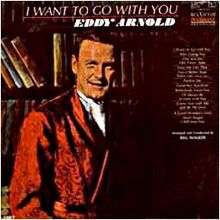I Want to Go with You (album)
I Want to Go with You is a studio album by American country music singer Eddy Arnold released by RCA Victor in 1966. It reached #1 in the US country charts and #26 in the Billboard 200 charts. Released as a single in early 1966, the title track "I Want to Go with You" peaked at #36 on the Billboard Hot 100 chart.[1] It was more successful with country and adult contemporary audiences, reaching #1 on both the Billboard country chart for six weeks and the easy listening chart for three weeks.[2]
| I Want to Go with You | ||||
|---|---|---|---|---|
 | ||||
| Studio album by | ||||
| Released | 1966 | |||
| Genre | Country | |||
| Label | RCA Victor | |||
| Producer | Chet Atkins | |||
| Eddy Arnold chronology | ||||
| ||||
Track listing[3]
Side 1
- "I Want to Go with You" (Hank Cochran)
- "Love Me Like That" (Don Deal)
- "Somebody Loves You" (Charles Tobias, Peter de Rose)
- "Good-Bye Sunshine" (Cindy Walker)
- "Don't Forget I Still Love You" (Guy Louis)
- "After Losing You" (Lee McAlpine)
Side 2
- "Come Live with Me and Be My Love" (Cindy Walker)
- "A Good Woman's Love" (Cy Coben)
- "One Kiss for Old Times Sake" (Arthur Resnick, Kenny Young)
- "I'll Always Be in Love with You" (Bud Green, Herman Ruby, Sam H. Stept)
- "Pardon Me" (Gordon Galbraith, Ricci Mareno)
- "You'd Better Stop Tellin' Lies (About Me)" (Vaughn Horton)
Production[3]
- Arranged and Conducted by Billy Walker
- Produced by Chet Atkins
- Recorded at RCA Victor’s “Nashville Sound” studio, Nashville, Tennessee.
- Recording Engineer: Jim Malloy
- Cover illustration - Mike Ludow
gollark: Well, you might not intend to, but you could still implode.
gollark: But wrong.
gollark: Then they would not research.
gollark: They could implode.
gollark: No it isn't.
References
- Whitburn, Joel (2004). The Billboard Book of Top 40 Hits, 8th Edition (Billboard Publications)
- Hyatt, Wesley (1999). The Billboard Book of #1 Adult Contemporary Hits (Billboard Publications)
- Original album sleeve notes
This article is issued from Wikipedia. The text is licensed under Creative Commons - Attribution - Sharealike. Additional terms may apply for the media files.